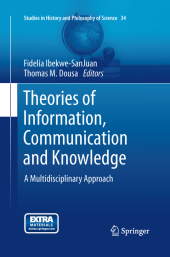 Neuerscheinungen 2015Stand: 2020-02-01 |
Schnellsuche
ISBN/Stichwort/Autor
|
Herderstraße 10
10625 Berlin
Tel.: 030 315 714 16
Fax 030 315 714 14
info@buchspektrum.de |

Thomas M Dousa, Fidelia Ibekwe-SanJuan
(Beteiligte)
Theories of Information, Communication and Knowledge
A Multidisciplinary Approach
Herausgegeben von Ibekwe-SanJuan, Fidelia; Dousa, Thomas M
Softcover reprint of the original 1st ed. 2014. 2015. vi, 331 S. 235 mm
Verlag/Jahr: SPRINGER NETHERLANDS; SPRINGER 2015
ISBN: 9400798334 (9400798334)
Neue ISBN: 978-9400798335 (9789400798335)
Preis und Lieferzeit: Bitte klicken
This volume offers a multidisciplinary exploration of information and communication as perceived in different disciplines and how those perceptions affect theories of knowledge.
This book addresses some of the key questions that scientists have been asking themselves for centuries: what is knowledge? What is information? How do we know that we know something? How do we construct meaning from the perceptions of things? Although no consensus exists on a common definition of the concepts of information and communication, few can reject the hypothesis that information - whether perceived as " object " or as " process " - is a pre-condition for knowledge. Epistemology is the study of how we know things (anglophone meaning) or the study of how scientific knowledge is arrived at and validated (francophone conception). To adopt an epistemological stance is to commit oneself to render an account of what constitutes knowledge or in procedural terms, to render an account of when one can claim to know something. An epistemological theory imposes constraints on the interpretation of human cognitive interaction with the world. It goes without saying that different epistemological theories will have more or less restrictive criteria to distinguish what constitutes knowledge from what is not. If information is a pre-condition for knowledge acquisition, giving an account of how knowledge is acquired should impact our comprehension of information and communication as concepts.
While a lot has been written on the definition of these concepts, less research has attempted to establish explicit links between differing theoretical conceptions of these concepts and the underlying epistemological stances. This is what this volume attempts to do. It offers a multidisciplinary exploration of information and communication as perceived in different disciplines and how those perceptions affect theories of knowledge.
Introduction; Fidelia Ibekwe-SanJuan and Thomas Dousa.- Chapter 1: Cybersemiotics: A new foundation for transdisciplinary theory of information, cognition, meaning, communication and consciousness; S›ren Brier.- Chapter 2: Epistemology and the Study of Social Information within the Perspective of a Unified Theory of Information;Wolfgang Hofkirchner.- Chapter 3: Perception and Testimony as Data Providers; Luciano Floridi.- Chapter 4: Human communication from the semiotic perspective; Winfried Nöth.-
Chapter 5: Mind the gap: transitions between concepts of information in varied domains; Lyn Robinson and David Bawden.- Chapter 6: Information and the disciplines: A conceptual meta-analysis; Jonathan Furner.- Chapter 7: Epistemological Challenges for Information Science; Ian Cornelius.- Chapter 8: The nature of information science and its core concepts; Birger Hj›rland.-
Chapter 9: Sylvie Leleu-Merviel. Coalescence in the informational process. Application to visual sense-making. Chapter 10: Understanding users´ informational constructs through the affordances of cinematographic images; Michel Labour.- Chapter 11: Documentary Languages and the Demarcation of Information Units in Textual Information: A Case Study; Thomas Dousa.- Index.


